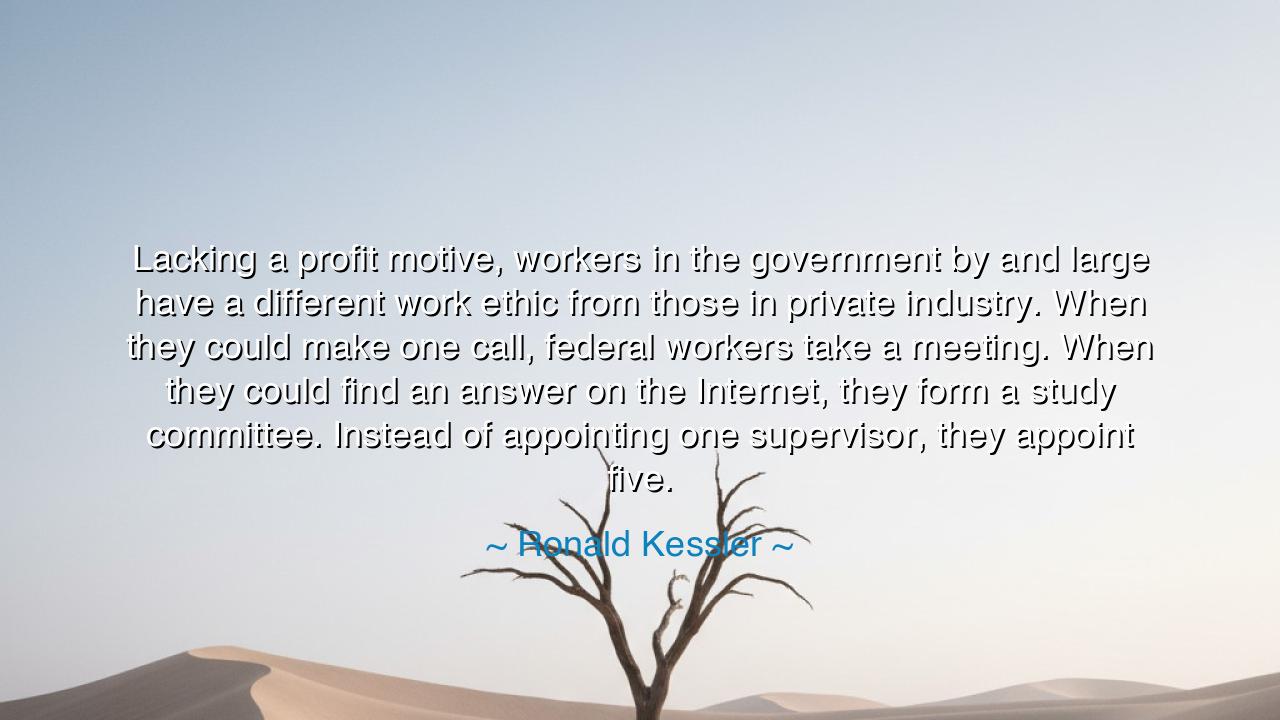
Lacking a profit motive, workers in the government by and large
Lacking a profit motive, workers in the government by and large have a different work ethic from those in private industry. When they could make one call, federal workers take a meeting. When they could find an answer on the Internet, they form a study committee. Instead of appointing one supervisor, they appoint five.






The words of Ronald Kessler strike like a craftsman’s chisel upon the marble of truth: “Lacking a profit motive, workers in the government by and large have a different work ethic from those in private industry. When they could make one call, federal workers take a meeting. When they could find an answer on the Internet, they form a study committee. Instead of appointing one supervisor, they appoint five.” It is both an observation and a lament—a cry against the creeping spirit of bureaucracy that smothers initiative beneath the weight of procedure. Kessler speaks of a sickness not of individuals, but of systems—a paralysis that grows when purpose is replaced by process, and the fire of action is cooled by layers of approval and delay.
In the style of the ancients, we may see this as a tale of misdirected virtue. The government, born to serve the people, often forgets its soul in the labyrinth of its own making. What began as a structure to ensure fairness becomes a maze that confuses all who enter. The profit motive, though often maligned, gives private men and women a certain edge—a hunger that drives them to cut waste, to think swiftly, to act boldly. But when that hunger is absent, when no consequence attends delay, the flame of urgency fades. Meetings replace deeds, committees replace conviction, and five supervisors guard what one could have achieved alone. The hand that once built for the common good now trembles, unsure which form to sign first.
The ancients, too, knew this peril. In the final days of Rome, before the empire’s collapse, the Senate became a sea of talkers rather than doers. When crisis struck, committees were formed instead of legions; reports were drafted while the barbarians broke the gates. The Roman historian Tacitus wrote that when corruption and complacency set in, “the more laws they made, the less justice there was.” So too does Kessler’s warning echo through time: when a system grows fat with its own caution, the vigor of its servants withers. Efficiency, that noble virtue of both thought and deed, dies in the suffocating embrace of excess structure.
Yet, let us not despise government itself, for it is not the vessel but the spirit within it that matters. There are public servants—quiet, steadfast, and noble—who labor not for gold but for duty. They rise each day with the same fire that once moved inventors, soldiers, and teachers. But even they must wrestle with the chains of bureaucracy, as a hero battles the hydra: slaying one form only to find three more take its place. Their courage lies in perseverance amid futility, their triumph in small victories unseen by the crowd. Kessler’s critique is thus not of the faithful worker, but of the system that dulls his edge and binds his hands.
We see reflections of this truth in modern history. Consider the rebuilding of nations after great wars—how private enterprise, driven by necessity and reward, often outpaces the public body weighed down by debate. After World War II, when Europe lay in ruins, it was the Marshall Plan—a vision forged by bold leadership and decisive action—that restored the continent. The plan succeeded because it blended government’s purpose with the energy of private endeavor, guided not by committees but by conviction. Where delay would have meant starvation, decisive governance became salvation. Thus, the lesson stands clear: systems thrive when action and accountability walk hand in hand.
Kessler’s words also bear a moral mirror to the individual. For whether one serves in government, business, or any walk of life, the disease of complacency lurks within all hearts. It is not profit alone that breeds excellence, but purpose. When we forget why we labor, when we serve procedure rather than people, our spirits grow dull. The true measure of a worker—be he merchant or minister—is not his paycheck, but his sense of responsibility. The greatest leaders, ancient or modern, share one trait above all: the refusal to let formality triumph over function.
Therefore, let this teaching pass into the hands of every generation: do not mistake motion for progress, nor process for purpose. The meeting that could have been a call, the report that could have been an act—these are the small betrayals by which greatness decays. Let every worker, whether in the palace or the workshop, remember that efficiency is not a vice but a virtue, and that wisdom lies in simplicity. To serve truly is to act swiftly, think clearly, and remember always that the measure of one’s labor is not in how many gather to discuss it, but in how deeply it serves the good of others.
Thus, Kessler’s words endure as both warning and guide: systems without purpose breed sloth, and service without urgency breeds decay. But where understanding and accountability meet, even the slowest institution can move like the heartbeat of a living nation. Let the heirs of tomorrow take heed—act while others deliberate, simplify where others complicate, and let your deeds, not your meetings, shape the destiny of your people.






AAdministratorAdministrator
Welcome, honored guests. Please leave a comment, we will respond soon